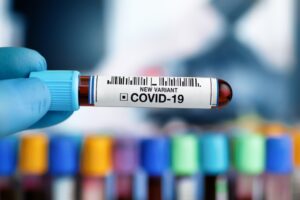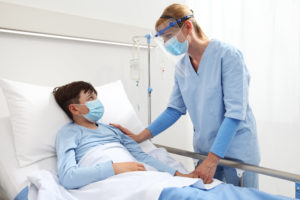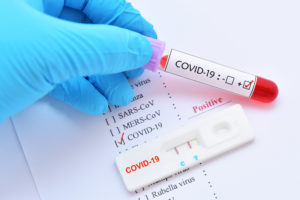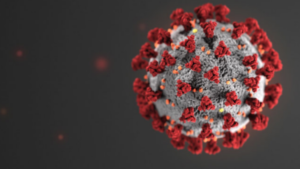Monday, December 26th, 2022
 With the holiday season in full swing, many people are planning to visit family and socialize in the coming weeks. But, concern over COVID-19 can quickly dampen the festive mood. In this article, we’ll discuss new COVID-19 variants and what you need to know to prevent infection all season long.
With the holiday season in full swing, many people are planning to visit family and socialize in the coming weeks. But, concern over COVID-19 can quickly dampen the festive mood. In this article, we’ll discuss new COVID-19 variants and what you need to know to prevent infection all season long.
COVID-19 Variants
The COVID-19 virus is constantly evolving, leading to several different variants over the past few years. Currently, Omicron is still considered the primary strain of COVID-19 in the United States. However, Omicron has several subvariants, including: (more…)
Sunday, February 20th, 2022
 While COVID-19 cases are dropping nationwide, the virus is still circulating. Unfortunately, babies and t children of any age can catch COVID-19 and experience its symptoms. As a parent, understanding how COVID-19 symptoms present in children can help you protect and care for your child.
While COVID-19 cases are dropping nationwide, the virus is still circulating. Unfortunately, babies and t children of any age can catch COVID-19 and experience its symptoms. As a parent, understanding how COVID-19 symptoms present in children can help you protect and care for your child.
The Severity of COVID-19 Infections in Children
Babies and kids are equally as likely to become infected with COVID-19 as adults. However, children aren’t as likely to become severely sick with COVID. In most cases, babies, kids, and adolescents who are infected with the virus are asymptomatic or experience only mild symptoms similar to the common cold.
With that said, children with pre-existing medical conditions are more likely to become severely ill with COVID-19. Diabetes, asthma, chronic lung disease, obesity, sickle cell disease, and any underlying condition that weakens the immune system are examples of pre-existing health concerns that can lead to severe illness with COVID in children.
Symptoms of COVID-19 in Children
Children who are symptomatic with COVID-19 typically have symptoms similar to those seen in adults. Potential symptoms include:
- Fever
- Chest pain
- Cough
- Sore throat
- New loss of smell or taste
- Nausea, stomach pain, vomiting, and/or diarrhea
- Skin changes (i.e. discolored patches on hands and feet)
- Muscle and joint pain
- Fatigue
- Headache
- Nasal congestion
Generally, COVID-19 symptoms develop around six days after exposure to the virus. However, this can vary depending on the variant. The Omicron variant, for example, often has a shorter incubation period (two to three days).
COVID-19 Vaccinations For Children
The Centers for Disease Control (CDC) recommends that everyone over the age of five receive a COVID-19 vaccine. While not a guarantee against catching the virus, vaccinations can prevent severe illness and complications from COVID-19. Additionally, getting your child vaccinated can prevent the spread of COVID-19 at home, in school, and in other public places throughout your community.
At Suncoast Urgent Care, we offer COVID-19 testing (including rapid testing), as well as medical care for children, adolescents, and adults suffering from COVID-19 symptoms. Contact us today for more information!
Friday, December 10th, 2021
 During the winter months, people are more likely to catch contagious viruses, including the common cold and influenza. However, following the COVID-19 pandemic, it’s no wonder that people worry that they have COVID-19 whenever they have a cough or scratchy throat. Here, we’ll discuss how you can differentiate between COVID-19 and other common viral infections at home. Keep in mind that if you’re feeling sick, you can visit Suncoast Urgent Care for prompt medical attention.
During the winter months, people are more likely to catch contagious viruses, including the common cold and influenza. However, following the COVID-19 pandemic, it’s no wonder that people worry that they have COVID-19 whenever they have a cough or scratchy throat. Here, we’ll discuss how you can differentiate between COVID-19 and other common viral infections at home. Keep in mind that if you’re feeling sick, you can visit Suncoast Urgent Care for prompt medical attention.
Do I Have COVID-19?
COVID-19 is caused by the SARS-CoV-2 virus. The symptoms and severity of this viral infection can vary greatly from case to case, which makes it difficult to identify without a COVID-19 test. (more…)
Tuesday, August 10th, 2021
 It’s been nearly a year and a half since the United States locked down due to the COVID-19 pandemic. There have been many changes in testing guidelines throughout the pandemic, leading to confusion about when to get tested for the virus. Here, we’ll discuss the current guidelines for COVID-19 testing so that you can stay safe and informed in the current stage of the pandemic.
It’s been nearly a year and a half since the United States locked down due to the COVID-19 pandemic. There have been many changes in testing guidelines throughout the pandemic, leading to confusion about when to get tested for the virus. Here, we’ll discuss the current guidelines for COVID-19 testing so that you can stay safe and informed in the current stage of the pandemic.
For People Who Are Fully Vaccinated
If you’re fully vaccinated for COVID-19, you should still get tested under a few different circumstances:
- If you have symptoms of COVID-19, get tested immediately.
- If you have close contact (within 6 feet for at least 10 minutes) with someone with an active COVID-19 infection, get tested three to five days afterward.
- If you travel internationally, get tested three to five days afterward.
(more…)
Thursday, April 15th, 2021
 The symptoms of infection with the COVID-19 virus generally subside within two weeks. But for some people, the effects of COVID-19 don’t stop there. Many people experience the “post-COVID syndrome,” where individuals have symptoms for far longer than the standard two-week period, even for months; in some cases, the effects of COVID-19 remain debilitating and disruptive to patients’ regular activities.
The symptoms of infection with the COVID-19 virus generally subside within two weeks. But for some people, the effects of COVID-19 don’t stop there. Many people experience the “post-COVID syndrome,” where individuals have symptoms for far longer than the standard two-week period, even for months; in some cases, the effects of COVID-19 remain debilitating and disruptive to patients’ regular activities.
Read on to learn more about the post-COVID syndrome and what you should do if you have long-haul COVID symptoms. (more…)
Wednesday, January 20th, 2021
 As we continue to endure the COVID-19 pandemic, many people are struggling to identify the distinction between a COVID-19 infection and a cold or flu virus. Receiving a COVID-19 test is the best way to know for sure if you’ve been infected by the virus. Additionally, if you’re feeling unwell, talking to a medical professional can ensure that you receive the care that you need.
As we continue to endure the COVID-19 pandemic, many people are struggling to identify the distinction between a COVID-19 infection and a cold or flu virus. Receiving a COVID-19 test is the best way to know for sure if you’ve been infected by the virus. Additionally, if you’re feeling unwell, talking to a medical professional can ensure that you receive the care that you need.
That said, it’s helpful to understand how COVID-19, the common cold, and the flu differ. Here, we’ll discuss the main differences between the symptoms of these viruses.
Colds Vs. COVID-19
The common cold causes symptoms that are less severe than both the flu and COVID-19. Additionally, unlike COVID-19, a cold usually doesn’t cause a headache or fever. (more…)
Wednesday, October 7th, 2020
 Tests explained !
Tests explained !
There are many tests available at this point. Some are done with blood and some with swabs from the nasopharynx and now some from saliva samples.
The MOST accurate test available is the RT-PCR test, most often performed using a nasopharyngeal swab. These tests are typically sent out to a lab that can perform this very sophisticated test. There is one manufacturer at present that makes this test available to do in the clinic but it is not widely available.
The commonly advertised RAPID test uses an "antigen" test. This machine looks for the presence of proteins from the virus whereas the RT-PCR test looks for the genetic material RNA from the virus. The rapid antigen test is NOT as accurate. In fact there is discussion that a patient with symptoms suggestive of COVID who has a negative antigen test should STILL HAVE a RT-PCR test to confirm that the rapid antigen test is correct.
Most experts agree the best use for the RAPID ANTIGEN test is to screen asymptomatic patients, not to diagnose COVID in someone with symptoms.
Suncoast Urgent Care is currently just performing the RT-PCR test and we have very consistently had 48 hour turnaround times for this test.
If you need a test to travel out of the country, or for return to school in Pasco and Pinellas counties, these all require the RT-PCR test, they will NOT accept an antigen test.
 With the holiday season in full swing, many people are planning to visit family and socialize in the coming weeks. But, concern over COVID-19 can quickly dampen the festive mood. In this article, we’ll discuss new COVID-19 variants and what you need to know to prevent infection all season long.
With the holiday season in full swing, many people are planning to visit family and socialize in the coming weeks. But, concern over COVID-19 can quickly dampen the festive mood. In this article, we’ll discuss new COVID-19 variants and what you need to know to prevent infection all season long. 
 While COVID-19 cases are dropping nationwide, the virus is still circulating. Unfortunately, babies and t children of any age can catch COVID-19 and experience its symptoms. As a parent, understanding how COVID-19 symptoms present in children can help you protect and care for your child.
While COVID-19 cases are dropping nationwide, the virus is still circulating. Unfortunately, babies and t children of any age can catch COVID-19 and experience its symptoms. As a parent, understanding how COVID-19 symptoms present in children can help you protect and care for your child.  During the winter months, people are more likely to catch contagious viruses, including the common cold and influenza. However, following the COVID-19 pandemic, it’s no wonder that people worry that they have COVID-19 whenever they have a
During the winter months, people are more likely to catch contagious viruses, including the common cold and influenza. However, following the COVID-19 pandemic, it’s no wonder that people worry that they have COVID-19 whenever they have a  It’s been nearly a year and a half since the United States locked down due to the COVID-19 pandemic. There have been many changes in testing guidelines throughout the pandemic, leading to confusion about when to get tested for the virus. Here, we’ll discuss the current guidelines for
It’s been nearly a year and a half since the United States locked down due to the COVID-19 pandemic. There have been many changes in testing guidelines throughout the pandemic, leading to confusion about when to get tested for the virus. Here, we’ll discuss the current guidelines for  The symptoms of infection with the COVID-19 virus generally subside within two weeks. But for some people, the effects of COVID-19 don’t stop there. Many people experience the “post-COVID syndrome,” where individuals have symptoms for far longer than the standard two-week period, even for months; in some cases, the effects of COVID-19 remain debilitating and disruptive to patients’ regular activities.
The symptoms of infection with the COVID-19 virus generally subside within two weeks. But for some people, the effects of COVID-19 don’t stop there. Many people experience the “post-COVID syndrome,” where individuals have symptoms for far longer than the standard two-week period, even for months; in some cases, the effects of COVID-19 remain debilitating and disruptive to patients’ regular activities. As we continue to endure the COVID-19 pandemic, many people are struggling to identify the distinction between a COVID-19 infection and a cold or flu virus. Receiving a COVID-19 test is the best way to know for sure if you’ve been infected by the virus. Additionally, if you’re feeling unwell, talking to a medical professional can ensure that you receive the care that you need.
As we continue to endure the COVID-19 pandemic, many people are struggling to identify the distinction between a COVID-19 infection and a cold or flu virus. Receiving a COVID-19 test is the best way to know for sure if you’ve been infected by the virus. Additionally, if you’re feeling unwell, talking to a medical professional can ensure that you receive the care that you need. 